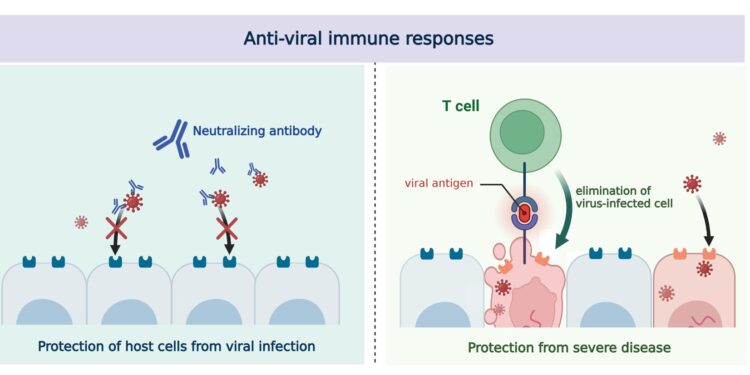Neutralizing antibodies and memory T cells are two components of adaptive immunity conferred by viral infection or vaccination. Neutralizing antibodies physically bind to viruses to prevent them from infecting cells. Although T cells cannot prevent viral infection, they can effectively seek out and destroy cells that have viral antigens on their surface, eliminating them to prevent further infection. Credit: Institute of Basic Sciences
It has been four years since the start of the COVID-19 pandemic. SARS-CoV-2 has not yet been eradicated and new variants are continually emerging. Despite extensive vaccination programs, breakthrough infections (infection after vaccination) with new variants are common.
New research suggests that human immune responses are also changing in order to combat the never-ending emergence of new variants of SARS-CoV-2. Specifically, it was found that the immune system that encountered a breakthrough infection with the omicron variant gains enhanced immunity against future versions of the omicron. The study is published in Scientific immunology.
A team of South Korean scientists led by Professor Shin Eui-Cheol of the Viral Immunology Center at the Korea Virus Research Institute at the Institute of Basic Sciences (IBS) announced that memory T cells which form during breakthrough omicron infection respond to subsequent strains of the virus.
Appearing in late 2021, the omicron variant of SARS-CoV-2 had significantly increased transmissibility compared to its predecessors, quickly allowing it to become the dominant strain in 2022. Since then, new omicron strains have not emerged. stopped appearing. Starting with BA.1 and BA2, strains BA.4/BA.5, BQ.1, XBB and more recently JN.1 were among the new strains of the omicron variant. This led to widespread infection despite vaccination.
After being infected or vaccinated, the body creates neutralizing antibodies and memory T cells against the virus. The neutralizing antibody serves to prevent host cells from being infected by the virus. Although memory T cells cannot prevent infection, they can quickly seek out and destroy infected cells, preventing the viral infection from developing into a serious illness.
The research team’s goal was to discover the changes that occur in our body’s immune system after suffering from a post-vaccination breakthrough infection. To answer this question, they focused on memory T cells formed after omicron infection.
Previous studies on the omicron variant have mainly focused on vaccine effectiveness or neutralizing antibodies, and research related to memory T cells has been comparatively insufficient.
Memory T cells formed after breakthrough omicron BA.2 infection showed a strong immune response not only against BA.2 but also against later omicron variants, including BA.4/BA.5, XBB, and others. By suffering from a breakthrough omicron infection, the immune system has gained the ability to handle future infections from emerging variants. This research shows that experiencing a breakthrough omicron infection can prevent a patient from progressing to severe COVID-19 when they encounter new variants of the virus in the future. Credit: Institute of Basic Sciences
The research team selected as subjects patients who suffered and then recovered from breakthrough omicron BA.2 infection in early 2022 and conducted studies on their memory T cells, particularly their ability to respond to various variants of the omicron such as BA.2, BA.4/. BA/5, and others.
To do this, immune cells were separated from the subjects’ peripheral blood, and the cytokine production and antiviral activities of memory T cells in response to various spike proteins of different variants were measured.
The results showed that memory T cells from these patients showed an increased response not only against the BA.2 strain, but also against the later BA.4 and BA.5 strains of omicron. By suffering from a breakthrough infection, these patients’ immune systems were boosted to fight off future strains of the same virus.
The research team also discovered the specific part of the Spike protein that is the main cause of the observed enhancement of memory T cells. These results show that once a person experiences a breakthrough omicron infection, they are unlikely to ever suffer severe COVID-19 symptoms from future emerging variants.
Researcher Jung Min Kyung who led this research said, “This discovery gives us new insights in the new era of COVID endemics,” adding, “It can be understood that in response to the constant emergence of new variants viral, our body has also adapted. to combat future strains of the virus.
Director Shin Eui-Cheol of the Viral Immunology Center commented: “This new discovery can also be applied to vaccine development. By looking for common characteristics between the current dominant strain and new emerging strains of viruses, there may be a greater chance of inducing memory. T cell defenses against later variants.
This research was conducted in collaboration with colleagues from Yonsei University Hospital, Korea University Hospital, Sungkyunkwan University and Samsung Medical Center.
More information:
Tamara Haque et al, TGFβ prevents IgE-mediated allergic diseases by limiting T follicular helper 2 differentiation, Scientific immunology (2024). DOI: 10.1126/sciimmunol.adg8691. www.science.org/doi/10.1126/sciimmunol.adg8691
Provided by the Institute for Basic Sciences
Quote: Evolution of the human immune system in the post-omicron era (January 19, 2024) retrieved on January 19, 2024 from
This document is subject to copyright. Apart from fair use for private study or research purposes, no part may be reproduced without written permission. The content is provided for information only.



